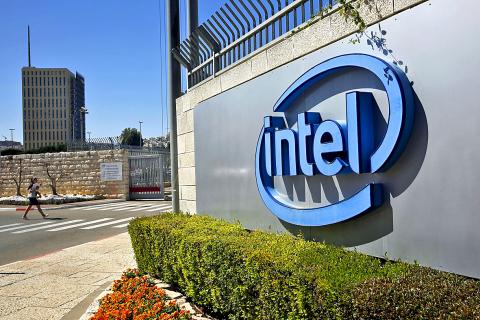Asustek Computer Inc (華碩) and Acer Inc (宏碁) yesterday said their relationships with Intel Corp would remain unaffected amid speculation about the computer chip giant’s planned exit from the mobile chip market.
Intel is canceling its Atom chips — provisionally titled Broxton and SoFIA — for smartphones and tablets, so that the company can focus on cloud and smart connected computing devices, it said.
“We are committed to long-term leadership and improved profitability of our mobile business and the decision to cancel Broxton for phones and tablets and SoFIA 3Gx/LTE/LTE2 enables us to move resources to products that deliver higher returns and advance our strategy,” Intel said in a statement, quoted by the AnandTech Web site on Friday last week.

Photo: Reuters
Part of Asustek’s ZenFone smartphone series uses Intel mobile chips and Acer uses Intel mobile chips for its tablets, but both Asustek and Acer declined to comment on Intel’s decision to scale back its mobile system-on-chip (SoC) business.
An Asustek official who declined to be named said Intel’s move is expected to only have a limited impact on Asustek’s smartphone segment, as the company has been reducing its use of Intel chips since the second half of last year.
Asustek’s smartphone business saw rapid growth in 2014 and last year, partly due to Intel’s subsidized sales of SoCs to Asustek ,which enabled the Taiwanese company to offer low retail prices for its smartphones while maintaining a healthy level of profitability, people familiar with the matter said.
Since Intel withdrew its subsidy plan in the first half of last year, Asustek has gradually lowered its use of Intel chips in its smartphones and shifted focus to Qualcomm Inc and MediaTek Inc’s (聯發科) SoCs, the people said.
By the end of last year, Qualcomm chips were used in between 50 percent and 60 percent of Asustek’s smartphone models, while Intel chips were used in less than 20 percent, the Asustek official said.
The official said Asustek’s upcoming flagship smartphone ZenFone 3 series would mainly use Qualcomm chips, and the percentage of Intel chips used in the firm’s handsets would continue to fall.
The relationship between Asustek and Intel would not be affected by the firm’s reduced use of Intel chips in its smartphones, the official said.
“Asustek and Intel are long-time partners. We look forward to cooperating in the Internet-of-Things [IoT] field or even in smart cars in the near future,” the official said.
Acer said the company and Intel have been collaborating on a wide range of products for a long time, and its existing projects with Intel would remain unchanged.
However, Acer said it would watch closely to see whether Intel’s planned decision would affect the Taiwanese firm’s product strategy, adding that products would be adjusted if necessary.

With this year’s Semicon Taiwan trade show set to kick off on Wednesday, market attention has turned to the mass production of advanced packaging technologies and capacity expansion in Taiwan and the US. With traditional scaling reaching physical limits, heterogeneous integration and packaging technologies have emerged as key solutions. Surging demand for artificial intelligence (AI), high-performance computing (HPC) and high-bandwidth memory (HBM) chips has put technologies such as chip-on-wafer-on-substrate (CoWoS), integrated fan-out (InFO), system on integrated chips (SoIC), 3D IC and fan-out panel-level packaging (FOPLP) at the center of semiconductor innovation, making them a major focus at this year’s trade show, according

DEBUT: The trade show is to feature 17 national pavilions, a new high for the event, including from Canada, Costa Rica, Lithuania, Sweden and Vietnam for the first time The Semicon Taiwan trade show, which opens on Wednesday, is expected to see a new high in the number of exhibitors and visitors from around the world, said its organizer, SEMI, which has described the annual event as the “Olympics of the semiconductor industry.” SEMI, which represents companies in the electronics manufacturing and design supply chain, and touts the annual exhibition as the most influential semiconductor trade show in the world, said more than 1,200 enterprises from 56 countries are to showcase their innovations across more than 4,100 booths, and that the event could attract 100,000 visitors. This year’s event features 17

EXPORT GROWTH: The AI boom has shortened chip cycles to just one year, putting pressure on chipmakers to accelerate development and expand packaging capacity Developing a localized supply chain for advanced packaging equipment is critical for keeping pace with customers’ increasingly shrinking time-to-market cycles for new artificial intelligence (AI) chips, Taiwan Semiconductor Manufacturing Co (TSMC, 台積電) said yesterday. Spurred on by the AI revolution, customers are accelerating product upgrades to nearly every year, compared with the two to three-year development cadence in the past, TSMC vice president of advanced packaging technology and service Jun He (何軍) said at a 3D IC Global Summit organized by SEMI in Taipei. These shortened cycles put heavy pressure on chipmakers, as the entire process — from chip design to mass

SEMICONDUCTOR SERVICES: A company executive said that Taiwanese firms must think about how to participate in global supply chains and lift their competitiveness Taiwan Semiconductor Manufacturing Co (TSMC, 台積電) yesterday said it expects to launch its first multifunctional service center in Pingtung County in the middle of 2027, in a bid to foster a resilient high-tech facility construction ecosystem. TSMC broached the idea of creating a center two or three years ago when it started building new manufacturing capacity in the US and Japan, the company said. The center, dubbed an “ecosystem park,” would assist local manufacturing facility construction partners to upgrade their capabilities and secure more deals from other global chipmakers such as Intel Corp, Micron Technology Inc and Infineon Technologies AG, TSMC said. It